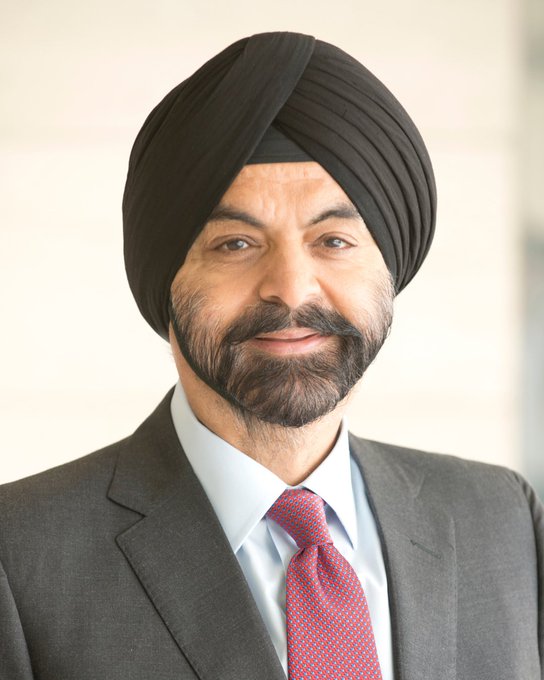As Ajay Banga, a former Wall Street CEO, was chosen as the World Bank’s new President, it will be interesting to learn more about the implications for such a bold move and what it means for climate finance moving forward. Banga begins his five-year term on June 2, 2023.
Banga most recently served as Vice Chairman at General Atlantic. Previously, he was President and CEO of Mastercard, a global organization with nearly 24,000 employees. Under his leadership, MasterCard launched the Center for Inclusive Growth, which advances equitable and sustainable economic growth and financial inclusion around the world. He was Honorary Chairman of the International Chamber of Commerce, serving as Chairman from 2020-2022.
He became an advisor to General Atlantic’s climate-focused fund, BeyondNetZero, at its inception in 2021. Banga also served as Co-Chair of the Partnership for Central America, a coalition of private organizations that works to advance economic opportunity across underserved populations in El Salvador, Guatemala, and Honduras. He was previously on the Boards of the American Red Cross, Kraft Foods, and Dow Inc.

Ajay Banga, incoming President of World Bank. Image credit: LinkedIn.
The World Bank is an international development organization owned by 187 countries. Its role is to reduce poverty by lending money to the governments of its poorer members to improve their economies and to improve the standard of living of their people. The Bank utilizes the Bretton Woods System, a set of unified rules and policies that provided the framework necessary to create fixed international currency exchange rates. The Bank’s selection process is an open, merit-based, and transparent nomination that involves thorough due diligence and a comprehensive interview.
While many development practitioners and global poverty reduction activists have criticized the selection of a Wall Street leader such as Banga, many of us believe the time has come for the Bank to be led by a senior professional with strong private sector expertise.
The Bank needs private sector solutions
When I left the Bank in 2016, after nine years leading Disaster Risk Management for the Washington, D.C.-based organization, the Bank was led by President Jim Yong Kim (a political appointee supported by President Barack Obama). Under his leadership, the Bank went through a complete overhaul which lasted two years. Part of the effort aimed at ensuring that the organization became a more market friendly entity, tapping into private equity and investment funds models to provide cutting edge investment solutions to fight poverty reduction and climate change.
While this effort had many shortcomings, it was part of a longer-term process of moving from analysis to action. And in so doing President Kim promoted shared prosperity via digital banking, climate finance, and entrepreneurship support just to name a few areas of his focus.
President Banga has plenty of capital markets and private sector experience to bring to the table. He will be particularly welcome by the Bank’s clients base, for example Ministers of Finance which are happy to embrace force-multiplying solutions and move away from the over-analytical data driven lending products the Bank continues to produce in massive quantities. This will also make the donor community more appreciative of this new “risk taking culture” being promoted to reduce poverty.
Rest assured though, there will be unhappy people. I recall when the Bank hosted a panel in 2011 which was provocatively called…Should the World Bank President be a CEO? While I attended the panel with enthusiasm, I was shocked by the level of outrage among the thousands of people that attended. Hardly anyone seemed to appreciate the important role the private sector could play in addressing development challenges.
Next steps
As Banga gets acquainted with his new job’s responsibilities, Morocco announced that it will host the 2023 Annual Meetings of the World Bank Group and the International Monetary Fund (IMF). This prestigious event brings together the Minister of Finance, Central Banks Governors, global leaders, policymakers, and financial experts from around the world. Similar to Davos Economic Forum, the Bank and IMF Annual Meetings discuss the world economic outlook, poverty eradication, economic development, and aid effectiveness. The summit will take place in the city of Marrakech, a vibrant and culturally rich destination that has long been a crossroads of global trade and exchange.
This event will be followed by the 2023 United Nations Conference of the Parties (COP) of the United Nations Climate Change conference (UNFCCC), more commonly referred to as COP28, which will be held from November 30 to December 12, 2023 at the Expo City, Dubai. So the global climate summit will be hosted by a hydrocarbon rich region. For the second year in a row, the Middle East hosts a COP event. Last year, it was Egypt which hosted the summit without producing any significant climate finance breakthrough. This year it is up to Abu-Dhabi to showcase its climate credentials; the Emirate state is expected to showcase its green hydrogen and clean tech investment leadership.
Based on his background, we should all expect Banga will hit the road running. He will continue to bring private sector skills, instruments, and financial rewards to the development tools the World Bank uses. These are not only needed but will be high in demand by recipient countries which are eager to tap into the capitalist system to get out of poverty and increase their prosperity. Expect a lot of changes in the Bank business model, the re-skilling of the Bank staff, as well as the use of capital markets tools to deliver competitive services to its emerging markets clients.












Read 0 comments and reply